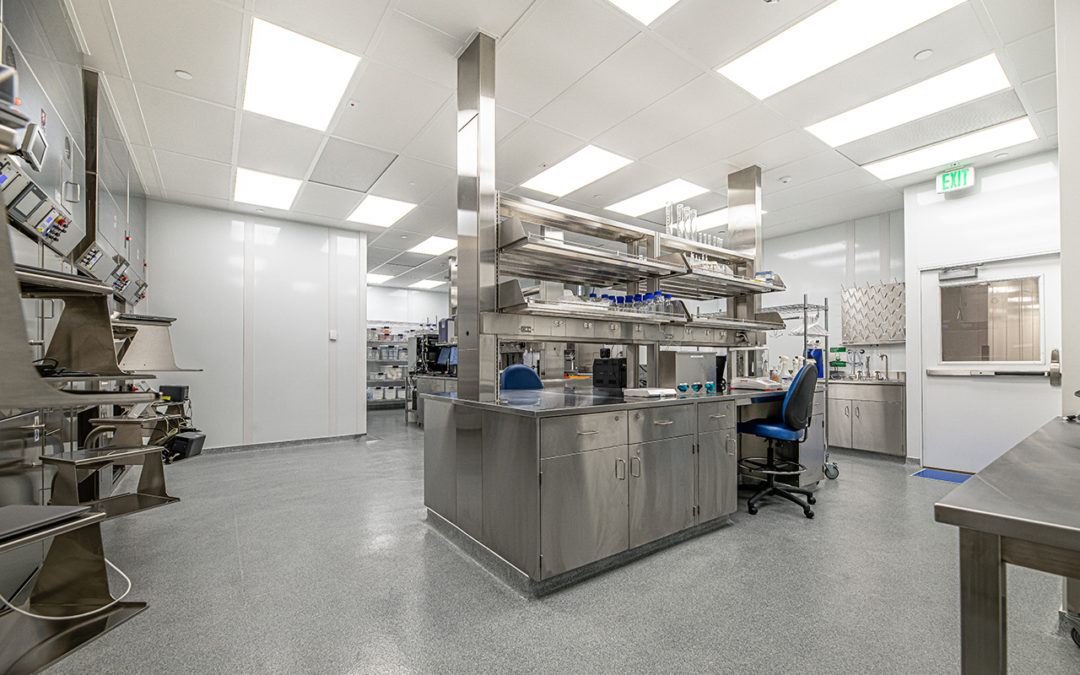What Is a GMP Cleanroom?
GMP stands for Good Manufacturing Practices, which are quality management standards most commonly used by medical and pharmaceutical manufacturers. Among other things, they help to ensure a controlled cleanroom environment that reduces the risk of microbiological, particulate, and pyrogen contamination during the preparation and sterilization of medicines or medical devices. In the United States, GMP standards are established and enforced by the Food & Drug Administration (FDA).
Therefore, a GMP cleanroom is a cleanroom that has been assessed and confirmed to comply with applicable GMP standards.
It’s important to mention cGMP here as well. If you’ve done any research regarding GMP standards, you might have seen “cGMP standards” pop up and wondered if they’re the same. They’re similar, but not quite the same. Note the differences here:
- GMP focuses on how your cleanroom is designed, built, and operates in a way that results in safe and effective products.
- cGMP focuses on how you use technologies and systems that are up-to-date and comply with GMP standards.
5 Industries That Require GMP Cleanrooms & Why
Now let’s take a closer look at a few industries that require GMP-compliant cleanrooms. While these aren’t the only industries or applications that need GMP cleanrooms, they’re some of the most common that we work with here at Angstrom Technology.
1. Pharmaceutical
Pharmaceutical cleanrooms are designed to house any application that involves medicines or supplements. This includes tasks like research, testing, compounding, packaging, and more.
The pharmaceutical industry calls for GMP cleanrooms in order to protect patient safety and ensure accurate, effective, and repeatable results. Without adherence to GMP standards, pharmaceutical cleanrooms could produce medicines that are ineffective, or even worse, harmful to human health.
In addition to GMP standards, some pharmaceutical cleanrooms that deal with compounding must also comply with another set of quality management standards: USP standards. Learn more about USP standards here.
Curious to see what a finished, GMP-compliant pharmaceutical cleanroom project looks like? Check out this one completed by our team at Angstrom Technology!
2. Radiopharmaceutical
Radiopharmaceuticals are a subcategory of pharmaceuticals that contain radioactive isotopes. In the past, they’ve been widely used as diagnostic agents to detect a range of health issues. Recently, they’re gaining recognition as a viable form of treatment for serious diseases like cancer.
Although they sound similar to traditional pharmaceutical cleanrooms, radiopharmaceutical cleanrooms require specific design considerations. This is because exposure to radioactive isotopes within the drugs can harm the health of cleanroom operators. Therefore, there are two reasons radiopharmaceutical cleanrooms must comply with GMP standards: to ensure accurate, effective, and repeatable results, and to ensure cleanroom operator safety.
Radiopharmaceutical cleanrooms must also comply with USP standards, specifically USP General Chapter 825. Explore USP General Chapter 825 guidelines here.
To see an example of a GMP-compliant radiopharmaceutical cleanroom completed by Angstrom Technology, click here.
3. Cell & Gene Therapy
Cell and gene therapy are two forms of regenerative medicine. In cell therapy, live and intact cells are injected into a patient to treat or cure the disease. In gene therapy, altered genetic material is injected into a patient to change how a single protein (or group of proteins) is produced by a cell, ultimately treating or curing the disease.
That said, cell and gene therapy cleanrooms house some extremely sensitive processes, such as cellular and genetic engineering, growth, and purification. GMP compliance is necessary in order to ensure product efficacy and patient safety.
Explore a GMP-compliant cell and gene therapy cleanroom project, completed by our partners at Connect 2 Cleanrooms, here.
4. Medical Device Manufacturing
Medical device cleanrooms are designed to house applications in which medical devices like injectables, surgical supplies, and imaging equipment are manufactured. Many people understand that consumables like medicine must be regulated, but what they don’t realize is that the devices used to help consume them must also be regulated. They come in contact with tissues and membranes, and can therefore affect patient health.
In order to protect patient health and safety, GMP compliance is required for any medical device cleanroom.
Angstrom Technology recently completed this GMP-compliant medical device manufacturing cleanroom project. Check it out!
5. Food & Beverage
Last but not least, any cleanroom involving food or beverage products requires GMP compliance. This could include activities like testing, manufacturing, packaging, or more.
Since food and beverage products are consumed, their production processes must be regulated by GMP standards to ensure consumer safety.
Start Your GMP Cleanroom Project With Angstrom Technology
GMP cleanrooms are built to ensure that health, medicinal, and food products are consistently safe for consumption. If your cleanroom application is required to meet GMP standards, contact our experts at Angstrom Technology. We’d be happy to design a cleanroom that meets applicable requirements and help you navigate the GMP qualification and validation processes.



